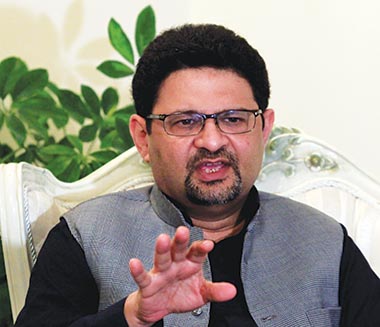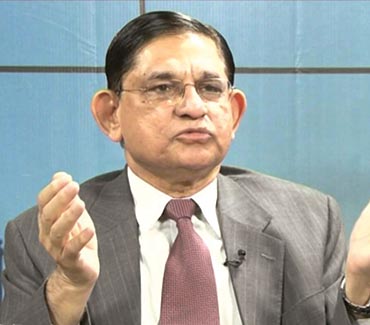Against the advice of Pakistan’s top economists and the opposition parties, the government yielded to the IMF pressure and got the highly controversial SBP Autonomy Bill 2021 passed from both the houses of the Parliament.
This month’s ‘Big Question’: Is the new SBP law good for Pakistan?
Narratives asked three top experts – former finance minister and senior PML-N leader Miftah Ismail, former advisor Ministry of Finance and Dean NUST Dr. Ashfaque H. Khan and senior economist Shahid Hasan Siddiqui — to give their views on this month’s Big Question.
Yielding to IMF

Former Finance Minister
Being a mainstream political party, the Pakistan Muslim League-Nawaz (PML-N) has remained in favour of the independence of the State Bank of Pakistan (SBP). Various past governments, including that of President Pervez Musharraf, had introduced reforms to strengthen the autonomy of the central bank. Yet, we believe that there is always room for further improvement.
However, what the PTI government has done in the name of SBP autonomy is something off the beaten track. The federal government has not done law-making for the independence of the central bank through the SBP autonomy Bill 2021, but went extra miles to empower an individual — the SBP governor. In fact, the government has given dictatorial powers to the SBP governor.
Now the governor enjoys more powers than even the elected ministers. No minister can appoint a 17-grade officer, but the SBP Governor has been empowered to pick his own deputy governors, and the federal government has no option but to appoint his nominees.
The incumbent governor (Reza Baqir) is already known for his solo-flights and not doing any consultations with the Finance Minister Shaukat Tarin. Even with the former finance minister his attitude was the same. Despite this known fact, the latest amendment in the SBP Act has dissolved the coordination board between the fiscal policy and monetary policy and instead called for establishing close liaison between the governor and finance minister through “mutual agreement,” which is impractical.
Mr. Tarin had opposed the dissolution of the coordination board in the prolonged talks with the IMF aimed at the resumption of the $6 billion loan programme. But the SBP Governor got the coordination board dissolved using the IMF as he had wanted.
Now the central bank’s role has been reduced mainly to controlling inflation, while the objectives of playing a role in the development and economic growth of the country are gone. Export refinance will no longer be conducted by the SBP, but a separate bank would be established for this purpose.
The kind of law making the government has done has reduced the role of the government officials at the SBP Board of Directors to next to nil. However, the influence of the IMF over the central bank has been further strengthened.
The State Bank of Pakistan is the bank of the nation. However, the government cannot take loans from its own central bank. This is something deceptive. This amendment is against Pakistan’s national interest.
The new legislation has withdrawn the day-to-day powers of the execution of the policy from the board of directors — which comprises the government officials — and placed it in the hands of the executive committee which includes the SBP governor, deputy governors and executive directors. Everyone in the committee would be at the mercy of the governor, as he has his hand-picked men as its members. How can his appointees go against him? The quorum of the committee would stand completed with only two persons, including the governor himself, and one executive director. This means the individual governor is now more powerful than the entire institution of the State Bank.
Another damaging amendment pertains to empowering the SBP to give confidential data to foreign institutions. So far the practice has been that the government used to give such data to foreign institutions under the Financial Action Task Force (FAFT) obligation and as a prove that the nation is working in compliance with the anti-money laundering (AML) and countering financing of terrorism (CFT) laws. The foreign institutions used to seek such data through foreign offices and the finance ministry shared it only after consulting with the law ministry. There was no one man show at all in the past. Now this has all changed.
The new law empowers the central bank to decide salaries of its officials with the governor sitting at the top of the hierarchy.
The Pakistan Muslim League-Nawaz has said on the record that it will initiate the process of undoing this dangerous amendment immediately after coming to power. We will introduce suitable amendments to unwind the recent amendments like the scrapping of the coordination board, sharing of confidential data with foreign institutions and barring the government from acquiring loans from the central bank.
We will restore the lost sanctity of the central bank and withdraw the draconian and dictatorial powers given to the SBP governor.
A Dangerous Amendment

Dean and Professor, NUST
The father of the nation Quaid-e-Azam Muhammad Ali Jinnah while addressing the inaugural ceremony of the central bank on July 1, 1948 said that “the opening of the State Bank of Pakistan (SBP) symbolizes the sovereignty of our state in the financial sphere…” But now we have sold this “financial sovereignty” for a mere $1 billion International Monetary Fund (IMF) tranche following the Senate’s approval of the so-called SBP Autonomy Bill 2021.
The IMF dictated Bill has transformed the SBP into a state within the state. Now, the central bank is working under the influence of the international lending institutions. The Act has given powers to the central bank governor to share sensitive information of domestic banks’ account holders with anyone, including the global financial players. These new rules of the greater game are set to damage domestic economic activities, create serious financial constraints, and keep the nation dependent on the IMF. The Act would ensure that the fiscal deficit remains wide and unmanageable, while the local and foreign debt continue to rise. It would also make the nation dependent on commercial banks and increase the cost of borrowing and budgeting as it has barred the government from borrowing from the SBP. The Act reads “the Bank shall not extend any direct credits to or guarantee any obligations of the government, or any government-owned entity or any other public entity.”
This is a dangerous amendment. Pakistan remains a fiscal deficit country. Most of the time, it needs financing to bridge its revenue-expenditure gap. Accordingly, the nation has to rely on the private sector banks to finance public sector development programmes, defence and social spending. Borrowing from the central bank was cheaper than taking loans from the commercial banks. The private sector banks could exploit the situation and increase the cost of lending.
The amendments also empower the central bank to avoid sharing its profit of around Rs. 1 trillion with the government. This will increase the fiscal deficit which will turn the government into a desperate borrower and the commercial banks will exploit this fiscal vulnerability. The new laws demand the creation of an Executive Committee at the SBP. Governor and deputy governors would have absolute powers to veto a decision taken by the government appointees at the Board of Directors. In other words, the Executive Committee has made the Board redundant.
The law has dissolved the board, which coordinated between fiscal policy and monetary policy. The dissolution of the coordination board would badly impact decision-making. In a developing country like Pakistan, all the state organs and key ministries must work in unison. Working in silos will further damage the economy. Previously, it was said that monetary policy was subservient to fiscal policy, but the dissolution of the Board has now made the fiscal policy hostage to the monetary policy. The demolished board — in which the decision-making was a collective exercise — comprised government officials from the planning commission, commerce and finance ministries, and the SBP.
The new laws prevent the government and its various arms — the Parliament, the Intelligence Bureau, the National Accountability Bureau and the FIA — from questioning the SBP officials, including the governor and deputy governors. The biggest flaw of the Bill is that no government, including the incumbent and the future ones, could undo these draconian laws without the will of the central bank — read the IMF. The Bill reads: “The Bank (SBP) shall be consulted prior to the introduction of any bill by the Federal Government in the Parliament, which may have a bearing on the functions of the Bank.”
Will the central bank, operating under the IMF’s umbrella, allow anyone to cut its hands by scrapping these amendments? The answer is “no.” This is the level of the so-called autonomy given to the present SBP governor, which is lethal for Pakistan’s economy.
The Bill not only changes the working of the SBP, but has made its Governor all-powerful. With such powers vested in one individual, friction between the Finance Ministry and the SBP is natural, which is a bad omen for the country.
Pakistan must do two things to undo this black law. Firstly, the SBP Governor Reza Baqir — who is an IMF man — must not have his services extended after his term ends in April 2022.
Secondly, we cannot unwind the amendments, while living under the IMF programme. So there must not be any 23rd IMF programme, which appears on the cards. These two steps could save Quaid-e-Azam’s Pakistan and fulfil his dream of the country’s financial sovereignty.
Risking our Sovereignty

Senior Economist
The passing of the SBP Autonomy Bill 2021 through both the houses; the National Assembly and the Senate has not strengthened the central bank’s independence, but made it an arm of the external forces, including the International Monetary Fund (IMF) and the United States.
The central bank is no more an organ of the state of Pakistan now. The new amendments introduced in the SBP Act have put Pakistan’s sovereignty and security at risk under the greater game of the United States.
We must fear that history may repeat itself. In 1965, when Pakistan and India went to war, and Islamabad asked oil marketing companies — all of which were operating in the private sector at that time — to import oil to fulfil the forces’ demand, they all refused to do so. These companies put their interest over and above the national interest. Their refusal to import the oil had put Pakistan under pressure from the very start of the war.
However, Iran was a close friend of Pakistan in those days. It supplied oil to Pakistan. Later on, the government established the state-owned Pakistan State Oil (PSO) to avoid this kind of situation in future.
This time around, the commercial banks may do what the private sector oil marketing companies did in 1965 if a war is imposed on Pakistan. The new amendments have barred the government from taking loans from the central bank. Now the governments will have nowhere else to turn to for loans but the commercial banks.
Leading commercial banks, including the top two: Habib Bank Limited (HBL) and United Bank Limited (UBL), are owned by foreign investors. They might not straight forwardly deny giving the required loan in those hours of high need, but, at least, delay it by 10-15 days in the name of taking permission from their board of directors. So what will happen? Will we be establishing the stated-owned central bank again at the end of a war?
Pakistan is already fighting a hybrid war. And now the enemies are attacking us by targeting and weakening our economy. The dissolution of the coordination board — that used to coordinate between the state’s fiscal policy board and the central bank’s monetary policy board to create harmony between the two policies — may end up messing up with the fiscal and monetary policies.
The coordination board was to make sure that both the fiscal and monetary policy boards were on the same page while formulating their respective policies. They were either making economic expansionary policies or contractionary policies, but not conflicting policies which may happen now and lead us towards economic disaster.
There was no need for the amendments introduced in the name of the so-called SBP Bill. The State Bank of Pakistan had already been given autonomy and independence needed for its transparent operations. There was no government interference in the central bank’s affairs. The SBP formulated the monetary policy and regulated the commercial banks without involvement of anyone from outside the central bank.
If the government really wanted to further strengthen the central bank’s independence then it should have framed laws to improve its accountability processes and procedures. However, the latest amendments have weakened the accountability procedures to the level where no one can hold the top level SBP officials accountable. They are now over and above the country’s laws.
If the central bank was not independent then how did the incumbent governor mess up the domestic economy by unnecessarily increasing the policy rate to 13.25 percent in 2019 and then cutting it beyond requirements to 7 percent during peak COVID-19 times — March-June 2020. His measures again put the domestic economy at high risk. The high import bill, the massive trade deficit, soaring inflation and the rupee depreciation; all hit historically high levels in the first seven-month (July-January) of the current fiscal year.
We have lost the central bank which Quaid-e-Azam Muhammad Ali Jinnah inaugurated in July 1948 that symbolized the “financial sovereignty” of the country.
Fifteen years ago from today, the then SBP governor said he was fully independent and as independent as any western central bank was while dealing with their respective governments. However, the IMF forced us to accept its dictation.




Comments are closed.